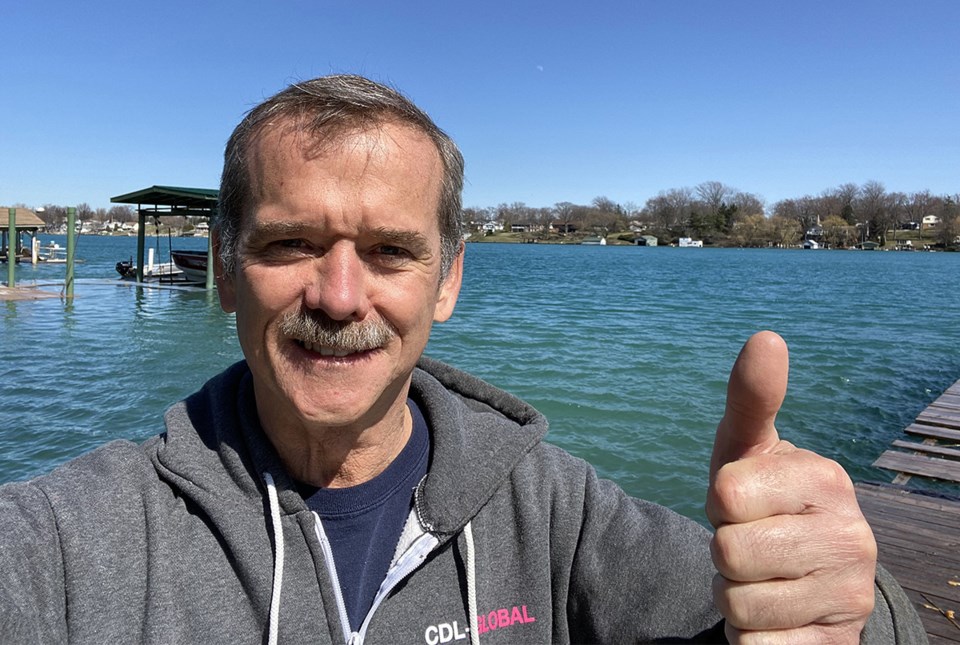Tara Jeffrey
Chris Hadfield is encouraging Sarnia-Lambton residents to make the most of their time in isolation.
“We are all fighting the common enemy,” said the retired Canadian astronaut and Sarnia native, currently staked out at his Stag Island cottage on the St. Clair River.
“And that gives us a great, unified sense of purpose. Turn your family into a little space crew and look for creative ways to make life good for each other.”
Hadfield — along with his wife, daughter-in-law, and granddaughter — made the decision to isolate at the family cottage when the deadly coronavirus pandemic began creeping into Canada last month.
“I’ve been to nearly 100 countries and I’ve been around the world 2,650 times; there’s no place I’d rather be than in Lambton County and on Stag Island,” he said. “With all the disruption going on in the world, I am very happy to be home.
“And if I’m going to be isolated, this is a great place to be.”
Aside from his typical island activities — preparing the cottage for summer, exploring nature with his granddaughter — Hadfield says he’s keeping busy with various projects, while wife Helene works away at her fourth university degree.
As Canada’s first astronaut to live aboard the International Space Station, the 60-year-old is fielding calls from business, leaders and media around the world, giving advice on how to survive, and thrive in isolation.
“I’ve been working with some of Canada’s big companies — they’re facing such a problem now, with distributed employees and how to keep people motivated, productive, healthy and happy.”
Most interesting, he said, is his ongoing work with technology companies to combat COVID-19, particularly a product called ‘Spotlight.’
“We’re trying to find a rapid way to diagnose whether someone has been exposed or not,” he said of his work with company Isberg. “Where you could lay your finger on top of a light sensor and within 15 seconds, by doing a spectroscopic analysis of your blood, it could say whether your body is reacting to COVID or not.
“I’m just trying to be as good an influence as I can possibly be with the particular public position that I have.
“Oh, and I’m writing a fourth book.”
Hadfield has followed the situation closely around the world and in Sarnia-Lambton, where the case numbers and deaths grew daily last week.
“This disease is a novel virus, it’s new. No one is immune. You can’t pretend that Lambton County is different than anywhere else,” he said. “What we’re seeing in Sarnia is completely predictable, and it’s just repeating the pattern that we’re seeing everywhere else in the world.
He added, “I’m trying to do what I think everyone should do, and that is, follow the situation within your own family, keep close watch on everybody. And then follow the situation in your community, whether it’s Corunna or Sarnia, and all across Ontario.”
A quick 15-minute search on credible sites like Health Canada or WHO to know the facts is helpful, he said.
“The only way to slow the pace of spreading is through isolation, not getting close to anybody else, except your immediate family who you live with,” said Hadfield, noting that just one member of their household leaves the island to buy groceries, as seldom as possible.
“This is going to go on a lot longer than anybody wants, and there’s only so many hospitals, doctors and nurses in Lambton County — we can’t all show up at the hospital with COVID, it would just overwhelm everything.
“Eventually we will all get COVID,” he continued. “But if it’s spread out over years, then we can handle it. We just can’t afford everyone getting it at the same time.”
The sooner everyone can accept that this is the ‘new normal’ for now, the better, he said, adding that people need to change their thinking from feeling ‘cooped up’ to feeling ‘safe.’
“We’re all in this together and we need to take care of each other — especially our elderly,” he said. “It’s a real time for community, and that can be as small as yourself and your family, or as big as the whole world — however much energy you have.”
And it’s not all doom and gloom, he stressed.
“The world’s going to keep on turning, spring is going to arrive, the flowers are going to come out, and it’s going to be gorgeous,” he said. “We just need to be patient, tolerant, creative and resourceful, good neighbours.”
